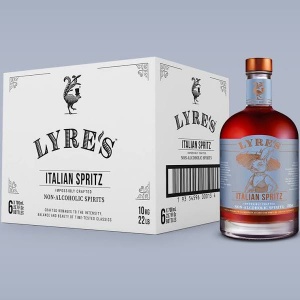Germany remains biggest market for low and no alcohol, but innovation happening in other, more dynamic markets

While Germany continues to dominate the no alcohol sector in volume terms, the biggest innovations in the no-alcohol space are to be found in smaller, dynamic markets such as the US, the UK, France and Australia.
This is according to the IWSR, which claims that over the coming years, no and low alcohol volume growth is likely to be most influenced by these countries, which all recorded double digit growth in 2020 – 2021, compared to a flat performance in the more established German market.
All four are also predicted to continue to grow. In France – and, to a lesser extent, in Australia – there is a dichotomy between the established, historic no-alcohol category, dominated by inexpensive brands and private label products, and emergent new-generation products retailingt significantly higher price points.
“In France, there are signs that new-generation no-alcohol spirits are recruiting new consumers and doing so on the products’ own merits,” said the IWSR’s market analyst Jason Holway. “Younger legal-drinking aged consumers in particular are choosing primarily new-generation no-alcohol brands not because they lack alcohol, but because of what they represent: quality ingredients, new sensory experiences and good taste.”
In Australia, non-alcoholic “whisky-like” product Claytons was popular in the 1980s – and now this latent trend is re-emerging. “Demand for non-alcoholic spirits is strong with consumers who want to be part of the social drinking ritual without the alcoholic element,” said Sarah Campbell, research director at IWSR.
“Successful no-alcohol brands are moving between no-alcohol categories in a way that is not always possible for regular alcohol,” added Susie Goldspink, head of no- and low-alcohol at IWSR, highlighting a number of examples of no-alcohol portfolios including Lyre’s which includes spirits, RTDs and sparkling wine in its portfolio, and the US--based Grüvi with its range of no-alcohol beer and wine.
In France, meanwhile, Le Petit Béret uses a patented method to produce “true” no-alcoholic products, in that no alcohol is removed from them because there is none there in the first place. The brand initially launched a range of wines, before moving into no-alcohol beer. Le Petit Béret also has plans to launch a selection of no-alcohol spirits including whisky, Bourbon, gin and rum alternatives.
The growing importance of the aperitivo occasion is also driving demand for non-alcoholic substitutes, according to Goldspink, pointing to the fact that the global spirit & wine aperitif category, for example, grew 23% in 2021, and is expected to grow at a 5% volume CAGR, 2021-2026. “Taking advantage of the success of the Aperol Spritz, multiple brands have launched no-alcohol versions across both the core spirit and RTD variants,” she said.
In the UK these products include established brand spin offs, Martini Floreale and Vibrante, Seedlip’s aperitivo sister brand, Aecorn, and specialist aperitif range Everleaf, which has secured retail and on-premise listings.
And a similar trend can be observed in Australia, where no-alcohol specialist Lyre’s launched its Italian Spritz variant in 2020, followed by an Amalfi Spritz RTD in mid-2021.No-alcohol products which market themselves as offering health benefits are innovating via the use of adaptogens, probiotics, antioxidants, nootripics and other naturally sourced ingredients.
For example, in Australia hemp-infused sparkling water Beyond Hemp, launched in February 2021, claims it will “restore, balance [and] hydrate” – while UpFlow Brewing Co has created a range of rehydrating sports ‘beers’ with added electrolytes for use on hot or active days.“
In the US, an increasing number of no-alcohol-specific retailers are launching,” said Adam Rogers, research director for North America at IWSR. “These include ecommerce platforms, as well as alcohol-free bars and retail stores in major cities. No-alcohol products can be sold anywhere with no restrictions, including online through major retailers like Amazon. By contrast, the sale of traditional-strength spirits remains largely limited in major online retailers.”
And traditional retailers are getting in on the act, with Woolworths in Australia embarking on a significant expansion of its low and no alcohol range last year, to exploit the growing so-called “sober-curious” movement, while in March this year Dan Murphy’s opened a zero alcohol bar.
“The no-alcohol market is still very much in its early growth stage in many categories and geographies, as the sector continues to define itself,” said Goldspink. “However, consumer interest and demand for no-alcohol offerings continue to grow, propelling brands to continue investing and innovating in the sector.”
